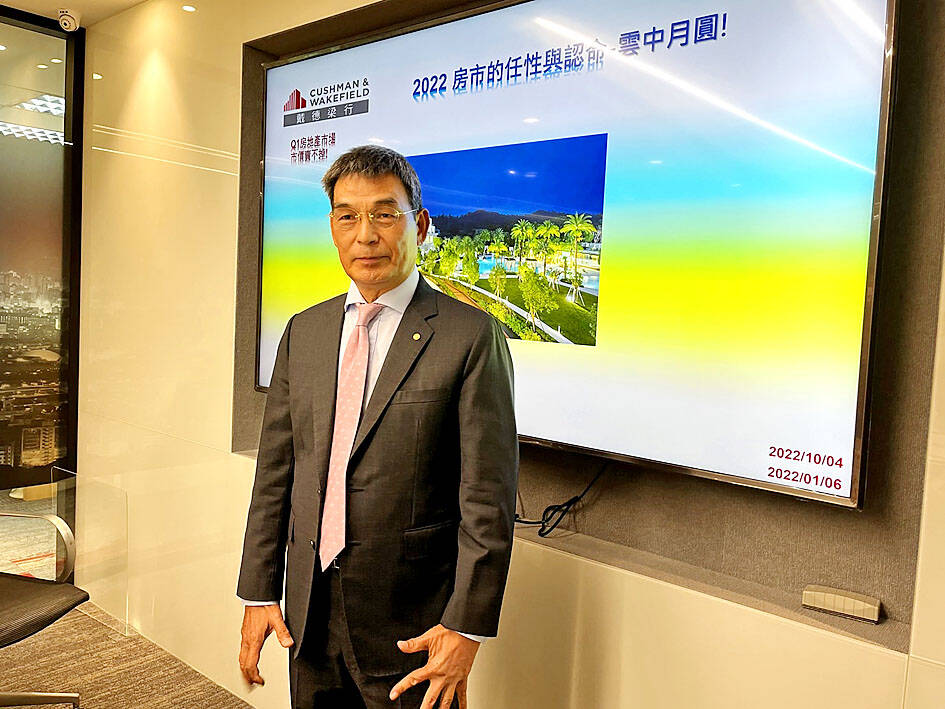Commercial property transactions last quarter totaled NT$34.6 billion (US$1.09 billion), up 24.9 percent from three months earlier on the back of solid demand for factories and factory offices, the local branch of international property consultancy Cushman & Wakefield said yesterday.
The volume reversed two previous quarters of decline, boosted by Taiwan Life Insurance Co’s (台灣人壽) purchase of an industrial building in Taoyuan’s Cingpu District (青埔) for NT$6.3 billion, Cushman & Wakefield Taiwan said.
The market is poised to slow or correct itself, as interest rate hikes would add hurdles to the investment plans of life insurers and other institutional players, which accounted for 65 percent of transactions in the first three quarters of this year, it said, adding that economic uncertainty also warrants caution.

Photo: Hsu Yi-ping, Taipei Times
Interest rate hikes mean that life insurers have to look for investment targets that generate higher rental incomes to meet regulatory requirements on minimum yields. The options would narrow in light of property price increases.
“There won’t be a revenge rebound to celebrate the upcoming border reopening ... rather, inflation, monetary tightening and other risks would continue to weigh on confidence,” Cushman & Wakefield Taiwan managing director Billy Yen (顏炳立) said, referring to an easing of COVID-19 rules for people arriving in Taiwan from Thursday next week.
The bull market is over, although the sell side is refusing to concede and is generally standing firm on prices, Yen said.
Confusion and chaos would dominate the market this quarter and price corrections would appear inevitable next year if things fail to improve, he said.
Land deals last quarter totaled NT$52.1 billion and would drop to between NT$160 billion and NT$180 billion for the whole of this year, lower than the 10-year average of NT$197.3 billion, ending three years of boom, the consultancy said.
Property developers have turned conservative about building land stock, shifting focus to urban renewal projects and joint ventures with land owners to cut development costs, it said.
The strategy makes sense, as it falls in line with the government’s policy to enhance building safety and would rein in business risks when building material costs rise and sales rates stall, it said.
Yen said he does not expect major land deals soon, but owners remain upbeat about land prices, which would translate into a 10 percent increase in presale house projects this quarter.
Price corrections would start in second-tier locations where property developers have overpriced projects, Yen said.

CHIP RACE: Three years of overbroad export controls drove foreign competitors to pursue their own AI chips, and ‘cost US taxpayers billions of dollars,’ Nvidia said China has figured out the US strategy for allowing it to buy Nvidia Corp’s H200s and is rejecting the artificial intelligence (AI) chip in favor of domestically developed semiconductors, White House AI adviser David Sacks said, citing news reports. US President Donald Trump on Monday said that he would allow shipments of Nvidia’s H200 chips to China, part of an administration effort backed by Sacks to challenge Chinese tech champions such as Huawei Technologies Co (華為) by bringing US competition to their home market. On Friday, Sacks signaled that he was uncertain about whether that approach would work. “They’re rejecting our chips,” Sacks

Taiwan’s exports soared 56 percent year-on-year to an all-time high of US$64.05 billion last month, propelled by surging global demand for artificial intelligence (AI), high-performance computing and cloud service infrastructure, the Ministry of Finance said yesterday. Department of Statistics Director-General Beatrice Tsai (蔡美娜) called the figure an unexpected upside surprise, citing a wave of technology orders from overseas customers alongside the usual year-end shopping season for technology products. Growth is likely to remain strong this month, she said, projecting a 40 percent to 45 percent expansion on an annual basis. The outperformance could prompt the Directorate-General of Budget, Accounting and

NATIONAL SECURITY: Intel’s testing of ACM tools despite US government control ‘highlights egregious gaps in US technology protection policies,’ a former official said Chipmaker Intel Corp has tested chipmaking tools this year from a toolmaker with deep roots in China and two overseas units that were targeted by US sanctions, according to two sources with direct knowledge of the matter. Intel, which fended off calls for its CEO’s resignation from US President Donald Trump in August over his alleged ties to China, got the tools from ACM Research Inc, a Fremont, California-based producer of chipmaking equipment. Two of ACM’s units, based in Shanghai and South Korea, were among a number of firms barred last year from receiving US technology over claims they have

BARRIERS: Gudeng’s chairman said it was unlikely that the US could replicate Taiwan’s science parks in Arizona, given its strict immigration policies and cultural differences Gudeng Precision Industrial Co (家登), which supplies wafer pods to the world’s major semiconductor firms, yesterday said it is in no rush to set up production in the US due to high costs. The company supplies its customers through a warehouse in Arizona jointly operated by TSS Holdings Ltd (德鑫控股), a joint holding of Gudeng and 17 Taiwanese firms in the semiconductor supply chain, including specialty plastic compounds producer Nytex Composites Co (耐特) and automated material handling system supplier Symtek Automation Asia Co (迅得). While the company has long been exploring the feasibility of setting up production in the US to address